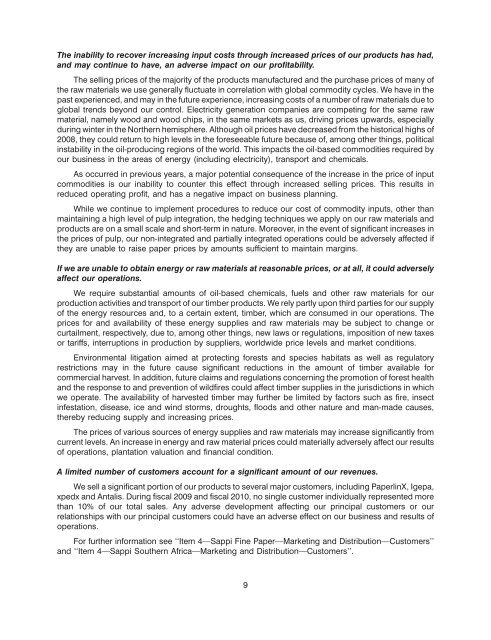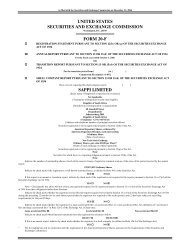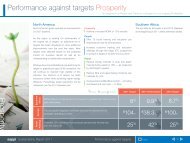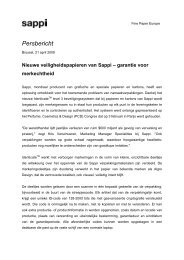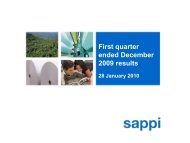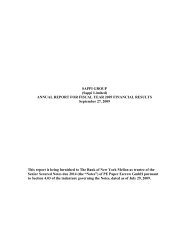Create successful ePaper yourself
Turn your PDF publications into a flip-book with our unique Google optimized e-Paper software.
The inability to recover increasing input costs through increased prices of our products has had,<br />
and may continue to have, an adverse impact on our profitability.<br />
The selling prices of the majority of the products manufactured and the purchase prices of many of<br />
the raw materials we use generally fluctuate in correlation with global commodity cycles. We have in the<br />
past experienced, and may in the future experience, increasing costs of a number of raw materials due to<br />
global trends beyond our control. Electricity generation companies are competing for the same raw<br />
material, namely wood and wood chips, in the same markets as us, driving prices upwards, especially<br />
during winter in the Northern hemisphere. Although oil prices have decreased from the historical highs of<br />
2008, they could return to high levels in the foreseeable future because of, among other things, political<br />
instability in the oil-producing regions of the world. This impacts the oil-based commodities required by<br />
our business in the areas of energy (including electricity), transport and chemicals.<br />
As occurred in previous years, a major potential consequence of the increase in the price of input<br />
commodities is our inability to counter this effect through increased selling prices. This results in<br />
reduced operating profit, and has a negative impact on business planning.<br />
While we continue to implement procedures to reduce our cost of commodity inputs, other than<br />
maintaining a high level of pulp integration, the hedging techniques we apply on our raw materials and<br />
products are on a small scale and short-term in nature. Moreover, in the event of significant increases in<br />
the prices of pulp, our non-integrated and partially integrated operations could be adversely affected if<br />
they are unable to raise paper prices by amounts sufficient to maintain margins.<br />
If we are unable to obtain energy or raw materials at reasonable prices, or at all, it could adversely<br />
affect our operations.<br />
We require substantial amounts of oil-based chemicals, fuels and other raw materials for our<br />
production activities and transport of our timber products. We rely partly upon third parties for our supply<br />
of the energy resources and, to a certain extent, timber, which are consumed in our operations. The<br />
prices for and availability of these energy supplies and raw materials may be subject to change or<br />
curtailment, respectively, due to, among other things, new laws or regulations, imposition of new taxes<br />
or tariffs, interruptions in production by suppliers, worldwide price levels and market conditions.<br />
Environmental litigation aimed at protecting forests and species habitats as well as regulatory<br />
restrictions may in the future cause significant reductions in the amount of timber available for<br />
commercial harvest. In addition, future claims and regulations concerning the promotion of forest health<br />
and the response to and prevention of wildfires could affect timber supplies in the jurisdictions in which<br />
we operate. The availability of harvested timber may further be limited by factors such as fire, insect<br />
infestation, disease, ice and wind storms, droughts, floods and other nature and man-made causes,<br />
thereby reducing supply and increasing prices.<br />
The prices of various sources of energy supplies and raw materials may increase significantly from<br />
current levels. An increase in energy and raw material prices could materially adversely affect our results<br />
of operations, plantation valuation and financial condition.<br />
A limited number of customers account for a significant amount of our revenues.<br />
We sell a significant portion of our products to several major customers, including PaperlinX, Igepa,<br />
xpedx and Antalis. During fiscal 2009 and fiscal 2010, no single customer individually represented more<br />
than 10% of our total sales. Any adverse development affecting our principal customers or our<br />
relationships with our principal customers could have an adverse effect on our business and results of<br />
operations.<br />
For further information see ‘‘Item 4—Sappi Fine Paper—Marketing and Distribution—Customers’’<br />
and ‘‘Item 4—Sappi Southern Africa—Marketing and Distribution—Customers’’.<br />
9


